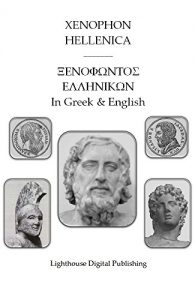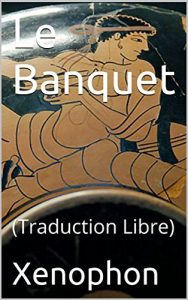English; H. G. Dakyns 1892
Greek; Xenophontis opera omnia, vol. 1, E.C. Oxford: Clarendon Press, 1900
This English-Greek translation is interleaved in small sections allowing the student to quickly cross reference Greek terms to their English equivalents.
Greek term search can be quickly accomplished using the "Complete Liddell & Scott's Lexicon with Inflections" published by Lighthouse Digital Publishing and also available for the kindle.
"Xenophon's Hellenica furnishes us with a contemporary record of a considerable and important period of Greek History - from the autumn of 411 to the summer of 362 - in all nearly forty-nine years. It begins in the middle of the twenty first year of the Peloponnesian War, at the point - or more exactly within a few weeks of the point - where Thucydides' unfinished work suddenly breaks off. It ends with the battle of Mantinea, wherein the Spartans suffered a crushing defeat, and the Thebans left their hero Epaminondas dead upon the field. With the loss of their leader Theban supremacy was at an end; Spartan power sank never to rise to prominence again; the general result for Greece was ἀκρισία [δὲ] καὶ ταραχή (confusion and disorder) greater than ever before."
George Edward Underhill
Xenophon the Athenian was born 431 B.C. He was a pupil of Socrates. He marched with the Spartans, and was exiled from Athens. Sparta gave him land and property in Scillus, where he lived for many years before having to move once more, to settle in Corinth. He died in 354 B.C.
Greek; Xenophontis opera omnia, vol. 1, E.C. Oxford: Clarendon Press, 1900
This English-Greek translation is interleaved in small sections allowing the student to quickly cross reference Greek terms to their English equivalents.
Greek term search can be quickly accomplished using the "Complete Liddell & Scott's Lexicon with Inflections" published by Lighthouse Digital Publishing and also available for the kindle.
"Xenophon's Hellenica furnishes us with a contemporary record of a considerable and important period of Greek History - from the autumn of 411 to the summer of 362 - in all nearly forty-nine years. It begins in the middle of the twenty first year of the Peloponnesian War, at the point - or more exactly within a few weeks of the point - where Thucydides' unfinished work suddenly breaks off. It ends with the battle of Mantinea, wherein the Spartans suffered a crushing defeat, and the Thebans left their hero Epaminondas dead upon the field. With the loss of their leader Theban supremacy was at an end; Spartan power sank never to rise to prominence again; the general result for Greece was ἀκρισία [δὲ] καὶ ταραχή (confusion and disorder) greater than ever before."
George Edward Underhill
Xenophon the Athenian was born 431 B.C. He was a pupil of Socrates. He marched with the Spartans, and was exiled from Athens. Sparta gave him land and property in Scillus, where he lived for many years before having to move once more, to settle in Corinth. He died in 354 B.C.












